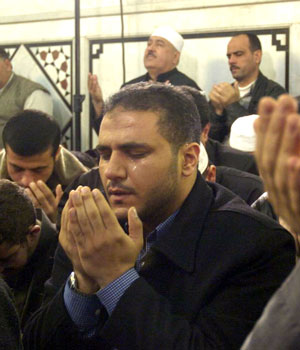
Syrian Muslims pray for rain in their country, which has been basking under warm weather for the past weeks, at the Ummayad mosque in Damascus, 16 December 2005 (AFP)
ABU DHABI, (Reuters) – Leaders of six pro-U.S. Gulf Arab states meet on Sunday to discuss Iran”s nuclear ambitions and a U.N.-Syria standoff, concerned that an escalation of these disputes could rock a region already suffering from instability in Iraq.
"There is concern that Iran”s nuclear programme could be weaponised.
At the end of the day they (Iranians) are building a nuclear reactor across the Gulf," one Gulf official said.
"There is also concern that if there is any military action (on Iran), Iran might retaliate and attack pro-U.S. allies in the Gulf," he said ahead of the two-day annual meeting held in the United Arab Emirates” capital Abu Dhabi.
Foreign ministers from the Gulf Cooperation Council (GCC) meet on Saturday ahead of the summit, which some analysts expect will call for intensified diplomacy with Iran. The GCC groups Saudi Arabia, UAE, Kuwait, Qatar, Bahrain and Oman.
"GCC countries are getting worried that things in Iran are getting out of hand," N. Jahardhan, analyst at independent think thank Gulf Research Centre.
"The GCC realises Iran is definitely a threat…Things have reached a critical stage and they feel they will bear the brunt of any escalation. It is clear that there is no defined policy in Iran about what to do if it is attacked."
Iran”s controversial nuclear programme is fuelling regional and Western fears that it is seeking to develop weapons, which Tehran denies.
But Iranian President Mahmoud Ahmadinejad”s verbal salvos at Israel –in which he called for the Jewish state to be wiped off the map –are stoking fears about its nuclear activities and making Gulf states even more anxious.
Any talks by the Sunni-led GCC with Shi”ite Iran would also focus on Tehran”s growing influence in Iraq where Shi”ites gained power after the ouster of Saddam Hussein. Saudi Arabia has bluntly accused Iran of meddling in Iraqi affairs.
STRONG WORDS FOR SYRIA
A Saudi official said Riyadh was keen the Gulf leaders demand Syria cooperate with a U.N. probe into the killing in February of former Lebanese Prime Minister Rafik al-Hariri, who enjoyed close ties with the kingdom.
"King Abdullah has taken the lead to persuade Syria to meet U.N. demands and Riyadh expects the summit to reflect Saudi desire for full Syrian cooperation," the official said.
Another Gulf official said the GCC is likely to issue a strongly worded statement on Syria. "They want Syria to comply with the United Nations and stop dragging its feet," he added.
The Security Council is reviewing a report by investigator Detlev Mehlis, who said new evidence implicated Syria in Hariri””””””””s murder. Syria insists it had no role in the killing.
Saudi Arabia had helped broker a deal between Syria and the United Nations by persuading Damascus to agree to the questioning of five Syrians over Hariri”s murder.
On the economic front, analysts expect talks to focus on turning bilateral free trade agreements (FTAs) between member states and other countries into deals with the whole bloc.
The GCC has reluctantly agreed to individual bilateral FTAs with Washington, even though they infringe on a joint tariff deal, but said trade pacts may not be signed with other states.
Saudi Arabia”s Labour Minister Ghazi al-Gosaibi has also said ministers will propose a six-year limit for expatriates to stay in Gulf states, which rely on millions of foreign workers.
He said the move aims to pre-empt any international laws which might force states to grant citizenship to long-term residents.

Drops of rain began to drizzle during prayers at the Umayyad Mosque in Damascus, December 16, 2005 (REUTERS)

Syrians used a portion of Friday prayers to pray for rain after President Bashar Assad called for citizens to make their personal pleas, 16 December 2005 (EPA)
